Today's Tarot for Niels Bohr
| The Fourfold Vision spread offers a progression of different ways of looking at an object, person, or situation. It is a powerful tool for gaining deeper insight into the specific subjects of other readings. The Palladini Tarot was created to "bridge the ancient and the future", using elements of Medieval, Egyptian and modern art. It is one of the most popular decks among new students of Tarot. If you would like your own copy of the Palladini Tarot, you can buy it now! |
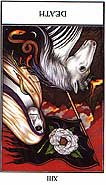 | The card on the far right represents the object being viewed, be it an idea, relationship, or the self. Death, when reversed: Stagnation or petrifaction. The refusal to let go of the past. Resistance to change because of fear. |
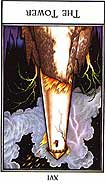 | The card second from the right represents the physical vision: how the object is seen at a base or mechanical level. The Tower, when reversed: Unexpected upheaval leading to a positive change in life. Catastrophe survived or narrowly avoided. A new lifestyle and enlightenment. May indicate a broken relationship, divorce, or failure in business or career. |
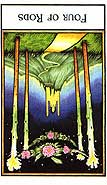 | The card in the middle represents the mental vision: the object personified and seen through a humanized perspective. Four of Rods (Completion), when reversed: Squandering a great and hard won victory through decadence and laziness. Failing to reward those truly responsible for an achievement. Using past accomplishments as an excuse to ignore current problems. Abandoning the very qualities that brought about initial success. |
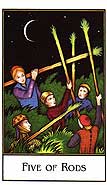 | The card second from the left represents the emotional vision: how passions and values are creatively stimulated by the mental vision. Five of Rods (Strife): An intense struggle motivated purely by the love of competition. A state of seeming chaos driven by endless small disputes and complications. A hotly contested race, debate, game, or other challenge. A stressful situation that brings out the best in the participants. |
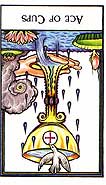 | The card on the far left represents the fourfold or mystical vision: still viewing through the previous three, we now add a spiritual element, revealing unseen aspects of the object. Ace of Cups, when reversed: The seed of a destructive relationship or spiritual collapse. A missed opportunity for joy, contentment, fertility, or enlightenment. Failing to understand the emotional needs of those around you. May represent an unexpected message, a chance meeting, or the start of a friendship or romance. |
|
|









